Barroso's American offensive
Adelina Marini, Anghel Shoylev, September 28, 2010
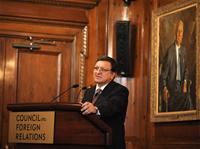 If you want to send a message to the US, where else could you do this if not the Columbian University in New York. One of the most prestigious American universities - the first in the city and the fifth oldest in the US. Each year it hosts the World Leaders Forum, the aim of which is holding an open dialogue on the most pressing and important issues of our time. Messages from the tribune of the university had sent such world leaders as Bill Clinton, Nicolas Sarkozy, Vladimir Putin, the Dalai Lama.
If you want to send a message to the US, where else could you do this if not the Columbian University in New York. One of the most prestigious American universities - the first in the city and the fifth oldest in the US. Each year it hosts the World Leaders Forum, the aim of which is holding an open dialogue on the most pressing and important issues of our time. Messages from the tribune of the university had sent such world leaders as Bill Clinton, Nicolas Sarkozy, Vladimir Putin, the Dalai Lama.
And if you want your message to be heard not only by the future generations of politicians and experts but by current decision makers too, then there is no better place than the Council on Foreign Relations, also in New York. This is an independent think-tank, publisher of the influential magazine Foreign Affairs. The President of the European Commission Jose Manuel Barroso chose exactly these two tribunes to present the European position on some global issues.
Almost a year after the ten-year process of internal construction ended, with the entering into force of the Lisbon Treaty the EU gave a serious statement for a leading role on global stage. This happened on the first of its kind European Council, dedicated entirely on the Union's common foreign policy. And although the Lisbon Treaty has created two new posts - of the president of the European Council (Herman van Rompuy) and the EU High Representative for external relations (Catherine Ashton), not one of them spoke at the Columbian University or the Council on Foreign Relations, but president Barroso did, in order to send several key messages.
In fact he was also the man who made the first in EU's history an American type State of the Union of address. Probably the coincidence in the titles of the speeches is not an accident. Its hidden meaning is that Europe is now like the US - united in an entity, sharing common values and having a common approach, especially with regard to the external world. Before his audience at the Columbian University Barroso spoke in a more general manner, by making a brief review of EU's development for its first 50 years of existence.
In support to the hidden meaning about the similarity between the EU and the US, Barroso stated that the Union already has a single currency which only for the first years of its creation has turned into the second global currency. The market is single and dynamic. A leading trade power and the second largest source of direct foreign investments.
In his speech the president of the Commission recalled briefly the evolution of the European Union as a community, by stressing that it is ready to be an adequate partner of the US in the fight against the global economic crisis. Furthermore, the interdependence between the US and the EU is huge because both generate together around one third of world trade of goods and services. The EU has no more natural partner than the US because of the common political and strategic interests, the president of the Commission continued.
"This very important relationship between the European Union and the United States must be seen in the context of unprecedented global interdependence. The economic and financial crisis brought this phenomenon into focus with a sharpness never seen before. This interdependence is combined with a shift in power from the old ‘West’ to both East and South, with new powers emerging, like China, India, Brazil and others".
And in order not to leave any doubts that the EU is already renovated and ready to appear on global stage, Jose Manuel Barroso added: "Our new ‘rules of procedure’ — the Lisbon Treaty — entered into force in December 2009. This Treaty gives us ways to act more efficiently inside Europe and means to defend Europe’s interests on the world stage". He again reiterated something he said during the European Council on September 16 that was directed to some bigger EU Member States, but also to the US:
"No country, no matter how powerful it may be — not even the United States — is able to tackle the challenges of the 21st century on its own. We either stand together and prosper or we fall separately. This is a fact of life in the 21st century". With these words of his Mr Barroso is obviously inviting the US for more intensive mutual work in a political and economic aspect, because the memories from Barack Obama's refusal to take part in the regular EU-US summit are still fresh, which was planned for this spring in Madrid. The reason - he did not know whom precisely he should talk to in Europe.
With this speech Barroso is obviously trying to underline that there is a person in Europe whom world leaders could talk to and this is him, as well as Mr Herman van Rompuy. He focused most of all on the fight against the global economic crisis because, undoubtedly this is a problem not only for the EU or the US, but for the entire world. The EU is now ready to play fully its part on global stage as a leading economic power.
Currently the US is in a hard economic situation. The budget deficit has reached unknown levels so far, which is indicative of the US's inability to tackle the crisis on their own. The fact that it was the growing deficit that forced the US to end their combat operations in Iraq should also not be ignored, and now they are also planning to do the same in Afghanistan. Maybe because of this Jose Manuel Barroso chose to focus on the economy during his presentation at the Council on Foreign Relations. He made a brief review of the way the EU tackled the consequences of the Greek crisis, that threatened the very existence of the single European currency and underlined:
"So to consolidate the progress we have made, it is now vital that Europe moves 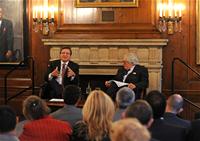 from crisis management to a reform agenda". The priorities he outlined are completing financial regulatory reform, continued fiscal consolidation, and tackling macro-economic imbalances by frontloading structural reforms. Barroso talked more in detail about the achievements on a European level - about the package for financial regulation, about the European semester, the new institutional architecture of Europe. He said that this was a serious leap forward of the European economic governance - a leap that would have an impact on global financial markets as well.
from crisis management to a reform agenda". The priorities he outlined are completing financial regulatory reform, continued fiscal consolidation, and tackling macro-economic imbalances by frontloading structural reforms. Barroso talked more in detail about the achievements on a European level - about the package for financial regulation, about the European semester, the new institutional architecture of Europe. He said that this was a serious leap forward of the European economic governance - a leap that would have an impact on global financial markets as well.
Another reason for Barroso to pick up economy as a focus of his appearance at the Council on Foreign Relations is that trade will have a leading role in forming the common European foreign policy. And if before the Council on Foreign Relations Jose Manuel Barroso tried to clarify that institutionally and economically Europe is a solid player who is now ready to return to the game, before the Columbian University his message was more specific - who else, if not Europe, will stand side by side to the US and defend the common interests and values?
This becomes clear from his final words at the Columbian University: "Lastly, safeguarding global security at large has also become a task we must share. The European Union is not shirking this responsibility. It is becoming increasingly active — and being recognised as effective — in its role as a spreader of peace and security in the world. We are taking part in crisis management operations in four continents. From Georgia to Kosovo, from Afghanistan to a number of African countries, we are engaging globally. Europe is a global player pursuing a political vision inspired by its values of freedom, justice and solidarity, and by a spirit of partnership. These same values are also in the fabric of the US society and system. The ties that bind us are second to none. Together we can achieve what we cannot alone".
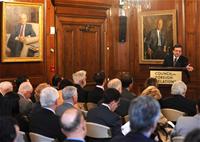 Whether President Barroso's messages will be heard by America we will probably see yet in November when the EU-US summit will take place in Lisbon. Until then, however, many unsolved issues remain between the transatlantic partners. And, in fact, part of them were raised during Barroso's discussion in the Council on Foreign Relations: a closer relationship between the EU and NATO, does the EU have a common vision about the fight against tax heavens, the trade strategy which the Commission will present in the end of October, entrepreneurial culture and the problems with starting a business in Europe compared to the strong entrepreneurial activity in the US, EU's commitment towards serious global problems.
Whether President Barroso's messages will be heard by America we will probably see yet in November when the EU-US summit will take place in Lisbon. Until then, however, many unsolved issues remain between the transatlantic partners. And, in fact, part of them were raised during Barroso's discussion in the Council on Foreign Relations: a closer relationship between the EU and NATO, does the EU have a common vision about the fight against tax heavens, the trade strategy which the Commission will present in the end of October, entrepreneurial culture and the problems with starting a business in Europe compared to the strong entrepreneurial activity in the US, EU's commitment towards serious global problems.
And for the EU the bilateral approach of the US with regard to the visa regime for the European citizens is still a problem. Nonetheless, Barroso laid a solid foundation for solving these issues, by demonstrating the the EU is now ready to face the world. It only remains words to transform into deeds.
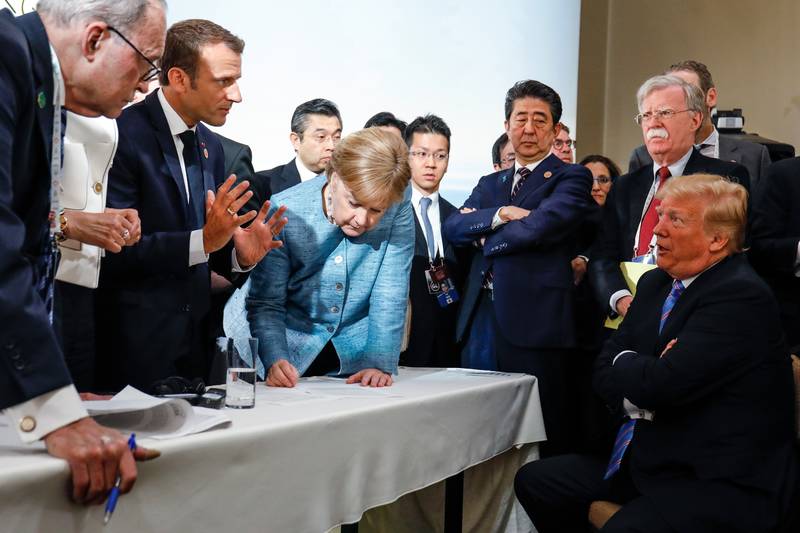 Macron, Merkel, Abe, Trump | © Council of the EU
Macron, Merkel, Abe, Trump | © Council of the EU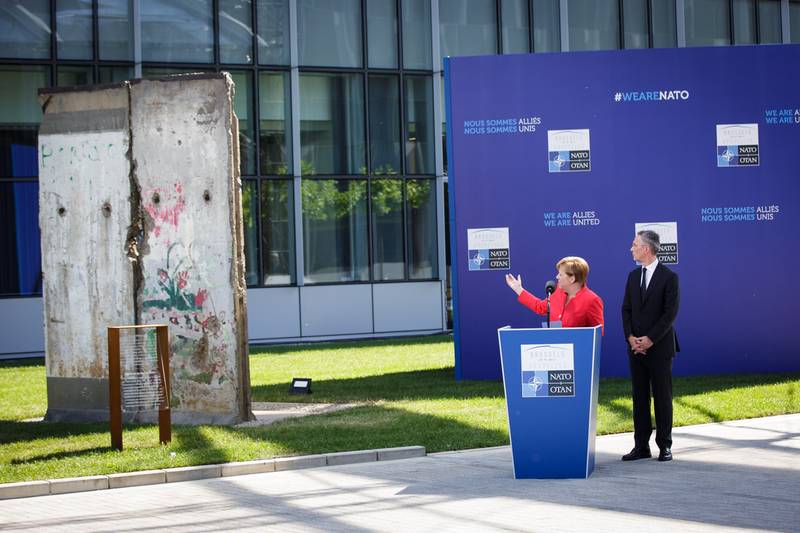 Angela Merkel | © Bundesregierung
Angela Merkel | © Bundesregierung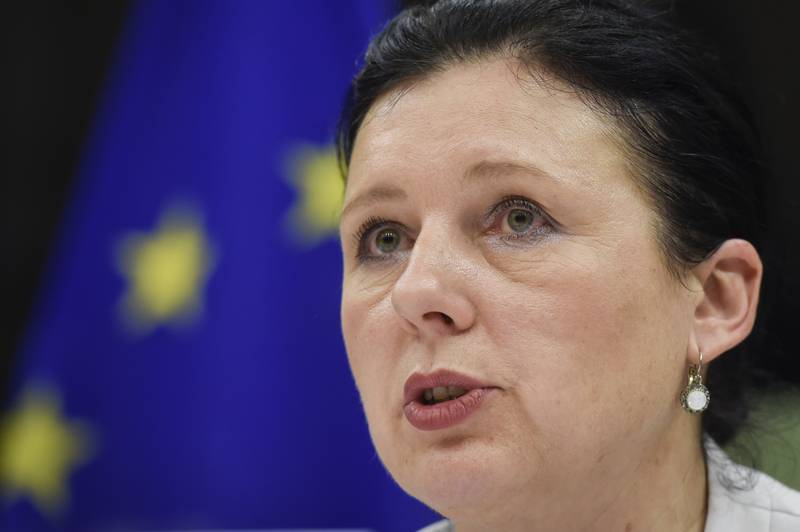 Vera Jourova | © European Parliament
Vera Jourova | © European Parliament